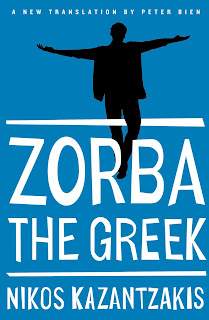Zorba the Greek
 Nikos Kazantzakis’ Zorba the
Greek is one of those famous books that is nothing like what you expect when
you start to read it. That, at least, was my experience. Perhaps I had expected
something purely comic: a Don Quixote of modern Greece. Since the novel does
have a comic duo of sorts in the intellectual narrator (‘Boss') and his much
more passionate sidekick (Alexis Zorba) setting out on an adventure, full of
illusions – there may be something in that comparison. Another starting point
might be to consider Zorba the Greek alongside The Great Gatsby – where the character
under study by the narrator is a down-to-earth working- man, rather than a
grand dreamer and great liar. Both novels have bookish narrators who admire
another man’s zest for life. In both books, the narrator is searching for some
meaning beyond the material concerns of his age.
Nikos Kazantzakis’ Zorba the
Greek is one of those famous books that is nothing like what you expect when
you start to read it. That, at least, was my experience. Perhaps I had expected
something purely comic: a Don Quixote of modern Greece. Since the novel does
have a comic duo of sorts in the intellectual narrator (‘Boss') and his much
more passionate sidekick (Alexis Zorba) setting out on an adventure, full of
illusions – there may be something in that comparison. Another starting point
might be to consider Zorba the Greek alongside The Great Gatsby – where the character
under study by the narrator is a down-to-earth working- man, rather than a
grand dreamer and great liar. Both novels have bookish narrators who admire
another man’s zest for life. In both books, the narrator is searching for some
meaning beyond the material concerns of his age.
The new translation by Peter Bien
opens with a prologue not included in the standard translation. The first line
reads ‘I often wished to write “the Saint’s Life of Alexis Zorba,” a labourer
of advanced age whom I exceedingly loved’ (1). In the prologue, the Boss
wonders what sort of book this will be –‘a novel, poem, complex make-believe
narrative …’ He decides what he has written is something else – a memorial.
While there is a plot of sorts and adventures relayed, ultimately the character
study of Zorba is what gives the book its focus. Chapter One begins thus: ‘I
first met him in Piraeus’ (9) and ends with the Boss writing his ‘saint’s life’
in a matter of weeks. Then comes the news of Zorba’s death. To say this up front
is not ‘giving away the ending’ – since this is all foretold and implied at the
beginning. It does help to understand the nature of the tale.
I read Zorba the Greece on the
island of Crete where it is set, and I admit I did this with some fear that I
was being a stereotypical tourist is search of some “truth”. I need not have
been nervous because the book is of tremendous quality and it is therefore
there is nothing to be ashamed of here. As to the plot: the Boss meets a
labouring man and together they take the night boat to Crete from Athens port
(Piraeus). The shared plan is to work an abandoned lignite mine – with the
narrator leaving most of the business to Zorba, while he spends his days
reading and writing a manuscript, inspired by Buddhist readings but not
described to the reader. They pair stay in Madame Hortense’s ‘miniature hotel’
in a coastal village – the room they share is really a bathing cabin rather
than a hotel room. Like Zorba, Madam Hortense has an adventurous life, but is a
sort of ancient ruin -- a windmill, if you like -- where Zorba conjures her
beauty.
Zorba has been involved in the
country’s many wars of the nineteenth century, and has scant regard for the
authority of the state, or religion. Kazantzakis also shows us the real horror
of honour killings, still prevalent in the twentieth century, and the
corruption (as he saw it) of religious institutions. At one point, Zorba
recalls murdering a Bulgarian priest ‘a fierce, bloodthirsty partisan’ who had
recently killed a Greek schoolteacher. When Zorba discovers that the priest had
5 children, he gives them all his money and runs. Here’s a short extract of
dialogue to show these themes from this section of the text:
Leaning against the wall, Zorba turned and looked at
me:
“That’s how I was saved,” he said.
“Saved from your country?”
“Yes, from my country,” Zorba answered in a calm, firm
voice. A moment later: “Saved from my country, saved from priests, saved from
money. No more sifting. I’m increasingly finished with sifting things out; I’m
simplifying. How can I express it to you? I am freeing myself, becoming a human
being.” (252).
The Boss longs for this sort of
simplicity, this ability to live in the moment, but like an artist – Zorba’s
philosophy has been born of suffering and experience; there is nothing bookish
about it. When the Boss and Zorba must part, Zorba’s dance speaks to his friend
in a physical language that fills both of their hearts with joy. Their parting
of ways is as moving as any in literature. Zorba’s last words to the Boss come
in the form of a letter: “People like me should live a thousand years. Good
night!”
As one who is more than a little
inclined to be bookish myself -- Would it not be good to capture at least some
of Zorba's dancing; his song, his love of the senses: his zest for life?



Comments
Post a Comment